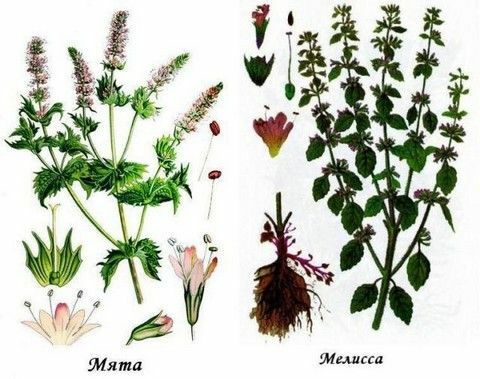- Melissa or mint?
- How is melissa useful?
- Melissa-based medicinal products
- Jam
- Contraindications
It is known that the herb of lemon balm was in high esteem even among the ancient Romans. About 2 thousand years ago, a healing broth was prepared from it, which helped to arouse appetite and calm down. From the Greek language the name of this plant is translated as "bee", and its lemon flavor acts soothing not only on the bees themselves, but also on the person. It is for this soothing property and soft lemon scent that the lemon balm is called "lemon mint", "lemon grass" and "heart grass".

Melissa or mint cooking?
Melissa is very often confused with mint due to the external similarity of their leaves. However, these plants are different. And if you want to use the medicinal properties of melissa, then you will not need to learn its differences from mint.
| Melissa | Mint | |
| Botanical Description | Family clearing. The plant can reach a height of 1.5 m. The stem is branched, pubescent with short hairs. It exudes a light lemon flavor. Fruit smooth - 4 nuts. Flowers are painted in lilac or lilac color, collected in inflorescences of 6-12 pieces, form false rings. | Family clearing. The root is thin, fibrous. The stem is erect. Leaves ovate, pointed with a fragrance of menthol. Plant height from 30 cm to 1 m. Fruits rarely, fruit - 4 nuts. Flowers form spicate inflorescences, painted in a pale purple color. |
| Essential oils content |
leaves and flowers contain not more than 0,8% |
leaves contain 2.75%, in inflorescences - about 6% |
| Application in medicine | Medicine is an antidepressant, antispasmodic and antiviral agent. | Pharmacology - is an obligatory component of herbal medicines intended for the treatment of bronchitis, gastric diseases and neuralgia. |
| Application in cooking | Cooking - as a substitute for scented pepper and as a seasoning for soup, salads, game. | Cooking - as a flavor for cocktails, alcoholic beverages, baked goods, soups, hot dishes. |

What is useful for lemon balm?
Useful properties of lemon balm allow the successful use of this herb for medicinal purposes.
Note! The effectiveness of melissa preparations is due to the presence in its composition of essential oils. The greatest number of them is contained in the leaves of the plant, which are often the basis of infusions and broths.
Let's enumerate the main qualities of the remedies that have a melissa in their composition:
- spasmolytic;
- soothing;
- carminative;
- sleeping pills;
- is a sedative;
- choleretic;
- is a diuretic;
- is a protective;
- is an anti-inflammatory;
- antiviral;
- bacteriostatic;
- is hemostatic.
Melissa is useful for colds, bronchitis and influenza - a decoction from her leaves will eliminate heat and ease expectoration. It successfully lowers blood pressure, eliminates shortness of breath and relieves nervous tremor. The use of the preparations of this plant positively affects the functions of the heart: there is a normalization of malfunctions in the heart rhythm and the frequency of contractions decreases.
This plant promotes the restoration of the intestine, normalizes digestion, controls metabolic processes and helps to remove bile. Melissa officinalis is able to "cheer up" the body, strengthen its protective functions, and improve brain activity.

Being a natural antidepressant, melissa helps to eliminate the effects of nervous overstrain, it calms and relieves stress. For the same reason, representatives of traditional medicine are often advised to give infusions and broths of this herb to children who are hyperactive and can not concentrate.
"Women's" grass
And what is the use of lemon balm for women? In fact, her nickname "women's grass", it was not accidental. Decoctions and infusions made from her leaves are capable of the following:
- bounce back to normal;
- to alleviate the manifestations of toxicosis;
- to eliminate climacteric neurosis;
- cure inflammation of the appendages;
- normalize the menstrual cycle;
- to facilitate the course of menstruation;
- to eliminate pain and heaviness in the lower abdomen in case of heavy menstruation;
- to increase the production of maternal milk during lactation.

Melissa-based medicines
Now it is worth talking about how to make lemon balm in various situations.
Decoction
Neurosis of the heart, stomach diseases, asthma, respiratory diseases:
- 10 g of dry raw material pour a glass of water;
- bring to a boil and cook for about 10 minutes;
- cool, filter;
- take 5 ml three times a day.
Infusion
Toxicosis, painful menstruation, climacteric neurosis, inflammation of the appendages, increased sexual excitability:
- 10 g of dry raw material pour a glass of boiling water;
- cover, leave for an hour;
- to filter;
- take half a cup three times a day.
Tea
Fragrant tea with melissa can be consumed daily. If you are worried about insomnia, it is best to drink it just before bedtime. In other cases, it can be done throughout the day half an hour after a meal.
Recommendation! Especially tasty and useful is Melissa tea, which will be added a small amount of mint and a spoonful of honey. It will help with pains in the stomach and eliminate excessive gassing.
Brewed green tea with melissa as follows:
- in a glass or porcelain teapot put a teaspoon of lemon balm and the same amount of mint;
- pour a liter of boiled water, the temperature of which will be about 80 ° C;
- leave for 15-20 minutes.
You only need to drink this tea freshly brewed.
Jam
Jam or fruit is usually used as a basis for jam. But in some world cuisines for this sweet delicacy they use completely unusual ingredients. Here we are going to prepare jelly from melissa.
Perhaps this sounds unusual, perhaps even strange, but after trying this dessert, you can not deny yourself the pleasure of cooking it again. And most importantly - it is very useful, as it is saturated with valuable components contained in the plant itself. In addition, the recipe for jam from melissa is quite simple.
Prepare ingredients:
- 600 g of lemon balm leaves;
- 1.5 kg of sugar;
- 15 ml of lemon juice;
- 300 ml of water.
The cooking process.
- Rinse out the raw material under running water, recline on a sieve to allow water to glass.
Tip! In this recipe, along with melissa, mint can also be used. The ratio of components in this case will be 1: 1.
- Transfer the grass into an enamel saucepan.
- Pour the lemon juice, add half of the indicated portion of sugar.
- Mix everything thoroughly.
- Cover the pan with a towel and leave for two hours at room temperature.
Note! During this time, the grass will let the juice, and it will dissolve sugar.
- The remaining portion of sugar is combined with water and boiled syrup.
- Mix the resulting syrup with the leaves in sugar, mix and leave for 5 hours.
- After, put the mixture on the stove, turn on the minimum heat and bring to a boil.
- Cook for 5 minutes.
- Hot jam pour over sterilized jars and roll up with metal covers.
Contraindications
It is obvious that lemon balm has a rather large number of beneficial properties, but, since this plant is medicinal, there are contraindications.
Since this herb is capable of showing a calming and sedative effect, it is necessary to dispense with the use of its drugs to patients suffering from hypotension.
In addition, the use of lemon balm is contraindicated in people whose work is associated with complex mechanisms, the need for concentration, and also requires motor activity.
Among the adverse reactions of the body to the preparations of this plant can be noted:
- heartburn, nausea and vomiting;
- drowsiness, muscle weakness, retardation of thinking;
- disorders in the digestive tract - constipation, diarrhea;
- dizziness.
